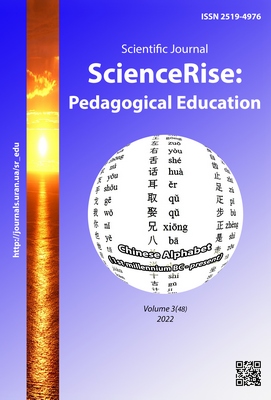Teaching business english to furure philologists in the regime of distance education
DOI:
https://doi.org/10.15587/2519-4984.2022.257853Keywords:
business English, distance education, methodical accompaniment, methodical principlesAbstract
The article is devoted to solving organizational, didactic and methodical problems of teaching business English to philological students in the regime of distance education. The aim of the article is improving methodical accompaniment of teaching business English to future philologists. The goals of the research are to attract English teachers’ attention to the necessity of encouraging students to use regular lexicon in private online communication and enforce the inter discipline coordination in teaching business English, lexicology and linguistic local lore study. Such methods of research as content analysis of pedagogical literature on the subject, questionnaire, generalization of various viewpoints concerning distance learning were used. Special attention should be paid to methodical accompaniment of teaching business English in online regime. It means that teachers should pay more attention to using productive ways of organizing classes under the condition of distance education. Students should create presentations, situational monologues after watching video clips, which represent abstracts from real business communication, reproduce telephone conversations with the help of formal speech patterns, given in the textbooks. Students should be exercised in writing business letters, answering reclamations etc. Methodical accompaniment requires keeping certain principles: interconnected teaching all kinds of speech activity (reading, speaking, listening, writing); dominant role of exercises; principle of culturological education. The necessity of keeping in mind social and linguistic cultural differences in communicating a native and a foreign language is also grounded by the author. Students’ answers to the questionnaire concerning their attitude towards distance learning and business English online show that most of them (88 %) are satisfied with such a way of studying. They also want more attention to be paid to understanding native speakers, telephone conversations, creating advertising production
References
- Bykov, V. Yu. (2006). Teoretyko-metodolohichni zasady modeliuvannia navchalnoho seredovyshcha suchasnykh pedahohichnykh system. Informatsiini tekhnolohii i zasoby navchannia, 1.
- Kozlovskyi, A. V., Panochyshyn, Yu. M., Pohrishchuk, B. V. (2011). Komp’iuterna tekhnika ta informatsiini tekhnolohii. Kyiv: Znannia, 463.
- Fominykh, N. (2011). Technological, didactic and social characteristics of WEB-2.0. VPP «Apostrof».
- Hryshkova, R. O. (2021). Pedagogical problems of distance teaching professional English. Pedahohichni nauky: teoriia, istoriia, innovatsiini tekhnolohii, 9 (102), 18–32.
- Frendo, E. (2008). How to Teach Business English. Pearson Longman, 162.
- Emmerson, P. (2011). Business English Handbook: Advanced. The whole of business in one book. Macmillan Education, 128.
- Zabolotska, O. O. (2010). Metodyka vykladannia inozemnykh mov u VNZ. Kherson: Ailant, 288.
- Malykhin, O. V., Pavlenko, I. H., Lavrentieva, O. O., Matukova, H. I. (2014). Metodyka vykladannia u vyshchii shkoli. Kyiv: KNT, 262.
- Tarnopolskyi, O. B., Kozhushko, S. P. (2004). Metodyka obuchenyia anhlyiskomu yaziku dlia delovoho obshchenyia. Kyiv: Lenvyt, 192.
- Tarnopolskyi, O. B. (2006). Metodyka navchannia inshomovnoi movlennievoi diialnosti u vyshchomu movnomu zakladi osvity. Kyiv: Firma «INKOS», 248.
- Sharma, P., Barret, B. (2007). Blended Learning. MacMillan Education, 160.
- Sprat, M., Pulverness, A., Williams, M. (2015). The TKT Course. Cambridge University Press, 188.
- Starr, P. (2006). Computing Our Way to Educational Reform. The Fvtrican Prospect, 47.
- Misztal, M. (2008). Tests in English: Vocabulary. Warszawa: Wydawnictwa Szkolne I Pedagogiczne, 351.
- Misztal, M. (2008). Tests in English: Word-formation. Warszawa: Wydawnictwa Szkolne I Pedagogiczne, 229.
Downloads
Published
How to Cite
Issue
Section
License
Copyright (c) 2022 Olena Diadchenko

This work is licensed under a Creative Commons Attribution 4.0 International License.
Our journal abides by the Creative Commons CC BY copyright rights and permissions for open access journals.
Authors, who are published in this journal, agree to the following conditions:
1. The authors reserve the right to authorship of the work and pass the first publication right of this work to the journal under the terms of a Creative Commons CC BY, which allows others to freely distribute the published research with the obligatory reference to the authors of the original work and the first publication of the work in this journal.
2. The authors have the right to conclude separate supplement agreements that relate to non-exclusive work distribution in the form in which it has been published by the journal (for example, to upload the work to the online storage of the journal or publish it as part of a monograph), provided that the reference to the first publication of the work in this journal is included.








